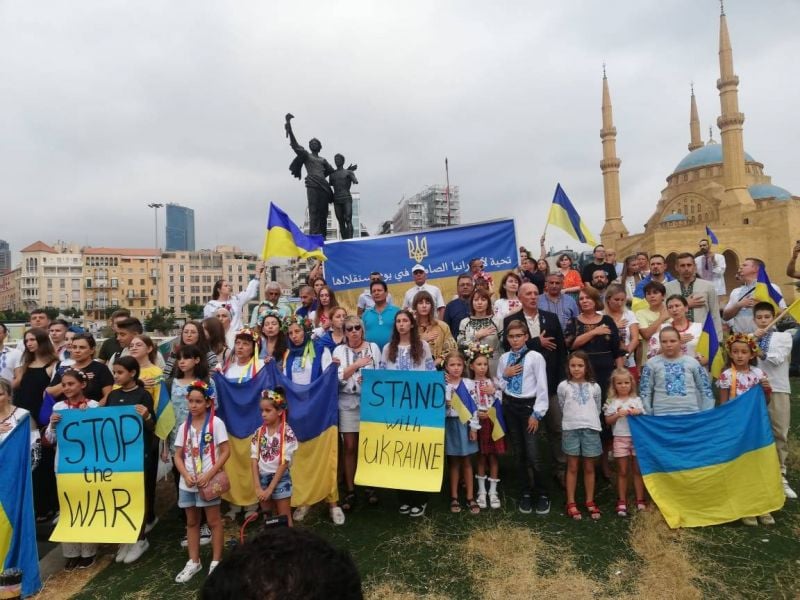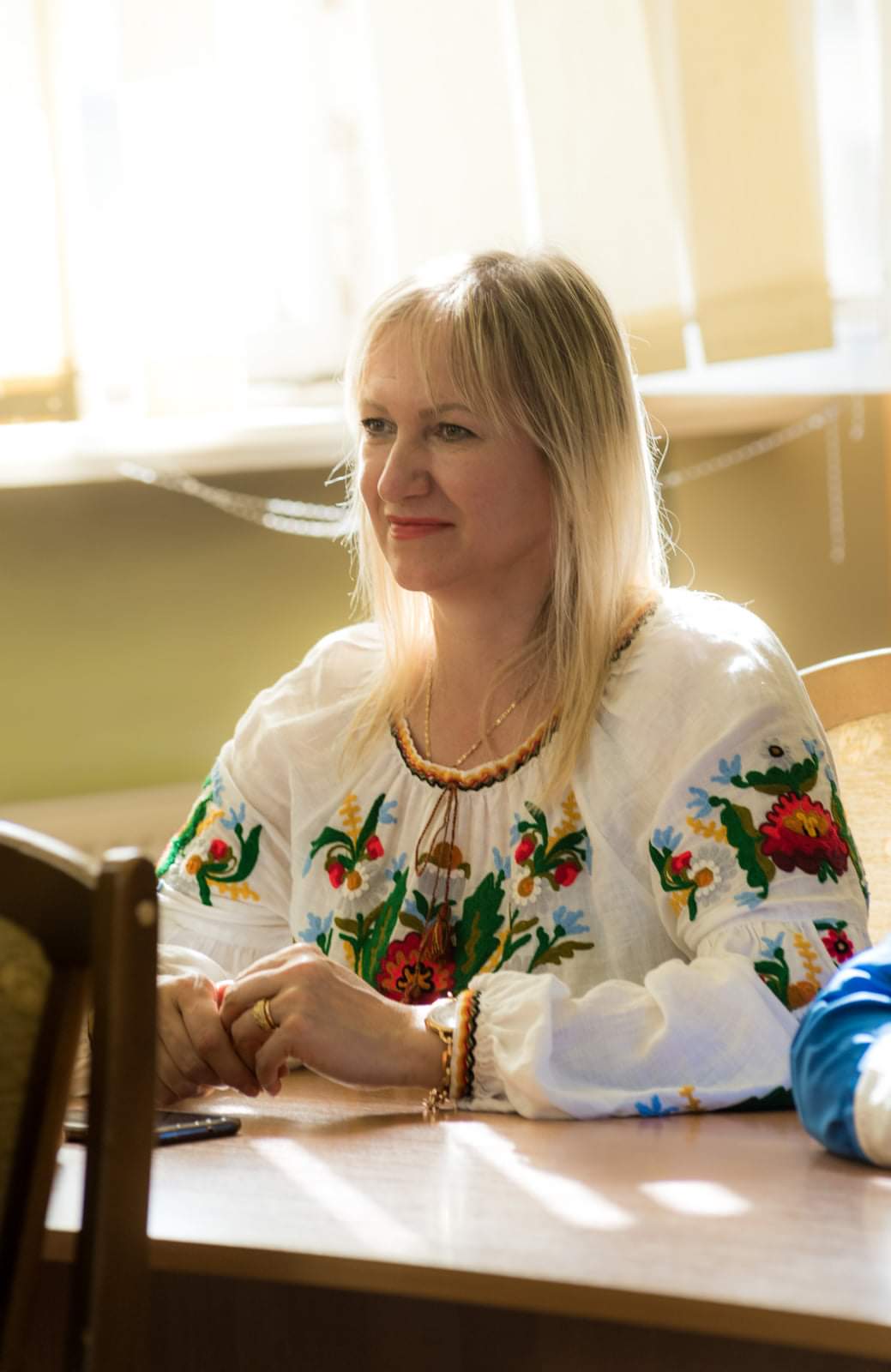
The Ukrainian community in Lebanon held a protest in Beirut's Martyrs' Square after Russia's invasion in February. 2022. (Credit: Iryna Jaramani)
BEIRUT — On Feb. 24, 2022, Alona Alexandrova-al-Mdawar was jolted with news that shook her world.
Her husband woke her up in the middle of the night and told her to call her parents, who were living in Kyiv, Ukraine.
“I immediately called my mom, and she was crying and shaking. She told us about the horrible explosions she was hearing,” Alexandrova remembers.
“The war started.”
On that day, all of Ukraine was startled awake by the sound of explosions — cities across the country were being carpet-bombed. It was the day Russia launched its full-scale invasion of Ukraine.
“I didn’t want to believe that it was happening. But later I saw the news, and I was speechless … I was crying all the time, I had panic attacks,” recalls Alexandrova.
She isn’t alone.
“We didn’t expect it to last this long,” says Iryna Jaramani, founder and president of the Ukrainian Community in Lebanon, an NGO. Jaramani lives in Baysour in Lebanon’s Aley district, with her husband. The couple met at university in Kyiv and now have five children.
 Jaramani wearing a traditional Ukrainian vyshyvanka. (Courtesy of Iryna Jaramani)
Jaramani wearing a traditional Ukrainian vyshyvanka. (Courtesy of Iryna Jaramani)
On the day of the invasion, Jaramani organized a protest in front of the Russian Embassy in Beirut.
Two years since then, at least 30,000 Ukrainian soldiers and 10,000 civilians have been killed, and cities have been flattened to the ground — although these figures are difficult to verify given the patchy information coming back from the front.
“What happened in the first few months was beyond human comprehension. Rape, murder, kidnappings. It was too much to process. So, we mobilized.”
Jaramani’s organization has hosted multiple charity events to raise funds for the Ukrainian Army and children affected by the war.
“Every family has someone in the army,” she says of her Ukrainian friends in Lebanon.
“Compared to the other girls here, I am calm. I have confidence that my parents are okay and ready for anything.” Her parents, who live in Kyiv, are “nationalists,” she says, and “are ready for anything. They won’t leave their homes.”
Jaramani says most Ukrainians living in Lebanon are women, married to Lebanese men, and estimates the number at 4,000. She believes Lebanon has the most active Ukrainian diaspora community in the Arab world.
“Maybe before the crisis, there were more. Some brought their families here, and others left for Canada and Europe because the situation in Lebanon is bad.”
Jaramani recalls the difficulties her grandmother faced living under Soviet rule. “They didn’t let her go to university. She was very smart. She was forced to stay back and work the fields. She was a poet and a writer. They denied her the right to an education.”
“It was slavery. She was forced to work in pig farms,” adds her daughter Suzanna.
She says millions of Ukrainians died during the Soviet Union’s orchestrated famines.
“Every third Saturday of November, we light candles and pray to commemorate those who perished in the famine,” says Jaramani.
“The current war is rooted in all of this history. This is the foundation. The start of it all.”
 Iryna's statuette of the Ukrainian and Lebanese coat of arms. (Credit: Lynn Jaafar/L'Orient Today)
Iryna's statuette of the Ukrainian and Lebanese coat of arms. (Credit: Lynn Jaafar/L'Orient Today)
A long-simmering conflict
While the 2022 Russian invasion is considered the start of the war in its general sense, the conflict started well before.
Ohannes Geukjian, a conflict resolution professor at the American University of Beirut, says among the political tensions that triggered the war is “Ukraine 's policy to distance itself from the Russian orbit by seeking to join Western structures including the European Union and NATO.”
Prior to the invasion, in February 2014, after the anti-Russia Euromaidan protests that culminated in the ousting of pro-Russian president Viktor Yanukovych, Moscow annexed the Crimean Peninsula and fighting broke out between Russian-backed Ukrainian separatists and government forces in the Donbas region. Although concentrated in the country’s east, this marked the start of the armed conflict. Since 2014, some 6.5 million Ukrainians have become refugees, and an additional four million have been internally displaced. Moscow, for its part, blames the West for using Ukraine as an instrument to extend NATO's borders to Russia's doorstep, and for being behind the events of 2014.
“To Putin, there was no independent Ukraine because historically Ukraine was part of Russia, and the Ukrainian people are of Slavic origin,” says Geukjian. Ukraine gained independence in 1991, with the dissolution of the Soviet Union.
Even before 2014, there were significant tensions and proxy conflicts between Russia and Ukraine.
Language revival
Jaramani’s organization features a Ukrainian language school that provides classes to both children and adults. “From Tripoli to Sour, we have teachers, and the ladies work so well and there are great results.”
Alongside Ukrainian, Jaramani, like most of her compatriots, speaks Russian, which is especially spoken in the south and east of Ukraine — areas immediately bordering Russia.
“We speak Russian because we had to study it in school,” she says. “I was born in 1975, under the Soviet Union. A lot of people from my generation don’t speak Ukrainian because they were forced to speak Russian,” she says. There are also long-standing stereotypes of Russian being hip and cosmopolitan, while Ukrainian is stuck in a rural past.
But now in Lebanon, “people are making an effort to learn Ukrainian.” Some have stopped speaking Russian altogether, she says.
‘Tea, not coffee’
One morning in December, Ukrainian psychologist Yana Debbas sits at a busy cafe in the Tabaris neighborhood of Beirut’s Achrafieh quarter, minutes away from her home.
Debbas gives group therapy sessions through Jaramani’s women’s club and the Ukrainian embassy in Beirut, where she has lived for the past eight years with her Lebanese husband.
She orders herbal tea.“Ukrainians are used to tea,” she says, taking a sip. “We didn’t really have coffee in Ukraine until the perestroika,” a “restructuring” of the Soviet system implemented by former Soviet President Mikhail Gorbachev in the 1980s.
She says the war has reflected in Lebanon’s Ukrainian and Russian communities.
“The fight between Lebanon’s Ukrainians and Russians happens passive-aggressively ... At events, at strikes in front of embassies. It's taboo to ask now what is written in your passport. Because it can be met with an aggressive answer,” Debbas says.
“Before the war, everyone was friends with everyone.” Now, there are cliques. “Belarusians with Russians, and Ukrainians with Kazakhs. Now two separate groups do separate events.”
When the fighting broke out in 2022, Debbas’ parents, who were living in Kyiv, became refugees and fled to Russia.
She says before the war, she never thought much about her personal identity.
“We spoke Russian throughout all our history. Only some parts of Ukraine speak Ukrainian. And now suddenly in one day, it changed. And I feel clearly Ukrainian.”
Debbas did some deep soul-searching and decided that “she’s not going to take sides.” She comes from Donbas, a Russian-speaking region in the east, and lately, she has been focusing on improving her Ukrainian, something she is “taking as an adventure.”
“They [Russians] are our brothers. We share culture. Who can understand us better? Which Europe? Germany? France? But now, things are complicated. This war broke basic trust,” she says.
Still visiting home
Airports in Ukraine have been closed since the invasion, but despite the risks, people are still visiting home.
“People are always coming and going. It didn’t stop us Ukrainians from traveling or visiting our parents during the war,” Alexandrova says.
She moved to Lebanon to work with the Caracalla Dance Theatre, a local dance company, in 2015.
Today she teaches yoga, dance and Pilates at the studio she and her husband, whom she met at a yoga training workshop in India, recently opened in Sin al-Fil.
In November, Alexandrova made the risky trip home to Kyiv to visit her family once again, despite the bombs.
“I was so happy to be with my parents, and I felt so safe because I know when air raids and rockets start, I’m with my mom and I’m with my dad.”
During her two-month visit, she was especially happy that on the weekends she could see her brother, who is fighting on the frontlines.
The trip from Beirut to Kyiv, which used to take four hours via a direct flight, now takes three days, she explains.
It consists of flying to the nearest border country, typically Poland, Moldova or Romania, and continuing by bus or train, Alexandrova elaborates.
“The biggest lines are in Poland. It can take you up to 10 hours just standing in the bus line on the border waiting,” she says.
She opted to travel through Romania. “It's 24 hours by bus. But on the borders, it's very fast. You wait a maximum of one to three hours on the borderline,” she details, “but it’s very hard. It’s exhausting.”
Debbas also made the trip back in September. She travels to Kyiv every six months to check on family property and to meet with her former university supervisor, with whom she still does some research.
She also goes back to observe. “The after-war work is huge. We are already doing research.”
“I arrived in Lviv and saw handicapped soldiers, drunk out of their minds. Begging for money. I didn’t hear missiles or anything for a few days, but then the last day I woke up at 4 a.m. to what I thought was the sound of fireworks.”
She quickly snapped into the reality that she was in Ukraine and that those were, in fact, not fireworks.
Brushing away the grogginess of sleep, she rushed to the nearest bomb shelter. “In the shelter, there were only two people. Everyone else stayed in bed. They’re used to it.”
“My friend’s children have serious eyes like adults. People are exhausted.”
The war is not likely to end soon, Geukjian says, despite all the losses. “It has become an attrition war.”
He spells out two possible end scenarios.
First, a Russian condition: “If Ukraine surrenders,” and a “pro-Russia government is established that takes Russia's national interests into consideration.”
Second, a Ukrainian condition. According to Geukjian, this implies Russian withdrawal from Donbas and Crimea, and perhaps a halting of US and European military aid to Ukraine, and the establishment of a “rapprochement policy with Russia,” which he doesn’t believe is likely anytime soon.
All the while, the women in Lebanon are watching from afar. Through her NGO’s women’s club, Jaramani says community members share experiences.
“We have guest speakers, writers and psychologists. We do festivals. And we support one another, emotional support especially. So, we feel like we can carry on,” she says.
“People here [in Lebanon] show us so much understanding and compassion. They tell us, ‘We understand you and we feel you. You guys are fighting for your land.’”